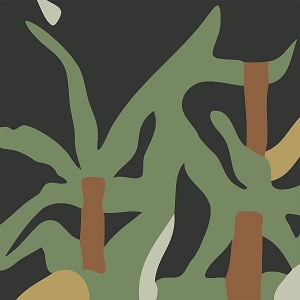 No one could have predicted another Valet record, not even Honey Owens. A rash of techno EPs with The Miracles Club over the last couple of years and a long silence on the hallucinatory front seemed to signal that she was finished with her freaked-out days as a guitar wrangler and soundscape shaper. Drum machines and synth pianos were her new instruments and the dancefloor was her new home, the most natural venue for her conversion to four-on-the-floor rhythms and house melodies. Then, with almost an electric shock, news of a new Valet album on Kranky. Not all is as it was before, however. After seven years and the birth of a child a lot has changed in Valet’s world, and the music has changed with it in a way that is almost as surprising as the album happening at all.
No one could have predicted another Valet record, not even Honey Owens. A rash of techno EPs with The Miracles Club over the last couple of years and a long silence on the hallucinatory front seemed to signal that she was finished with her freaked-out days as a guitar wrangler and soundscape shaper. Drum machines and synth pianos were her new instruments and the dancefloor was her new home, the most natural venue for her conversion to four-on-the-floor rhythms and house melodies. Then, with almost an electric shock, news of a new Valet album on Kranky. Not all is as it was before, however. After seven years and the birth of a child a lot has changed in Valet’s world, and the music has changed with it in a way that is almost as surprising as the album happening at all.
Before Honey Owens dropped the Valet moniker and leaped into The Miracles Club, she sang and played guitar, percussion, and synthesizer on albums by Nudge and Jackie-O Motherfucker. Which is to say, she manipulated instruments for those groups in one fashion or another. By her own admission, she didn’t know how to play an instrument in 1998, when Tom Greenwood and company asked her to perform on Flat Fixed, but she must have been a quick learner. In 2002 she recorded with Paul Dickow and Brian Foote on Nudge’s Trick Doubt, showing not even the least sign of dilettantism, intentional or otherwise. Five years later, when she recorded Blood Is Clean, she had her rudiments in order and was pulling barbed wire from her guitar with the kind of energy and confidence that only practice can yield, but her sound was still nervy and unpolished. Both that album and Naked Acid radiate a sweaty, basement-sessions type of heat. They are bluesy and humid, records swamped in fuzz and the psychedelic fever of drugs and new age self-discovery.
That heaviness translated well on Nudge’s As Good as Gone, released in 2009, which is appropriate because after that the trippy Valet sound disappeared. A series of 12" EPs as The Miracles Club, her acid house project with Rafael Fauria, followed in 2010, ‘11, and ‘12. One of them, A New Love, was released on Mexican Summer. XLR8R then asked them to host a podcast and eventually they produced a dance video so goofy and uninhibited, it could have only come out of Portland, Oregon. Then Owens and Fauria had a kid together and suddenly Valet was on the table again.
Nature sees Honey Owens back behind her guitar, but it doesn’t see her all the way back to the tenderfoot rawness of her first two albums. Rafael Fauria is with the band this time and Mark Evan Burden returns from Naked Acid to play the drums, bass, and keyboard with them. The addition of a new member alone makes a tremendous difference. It transforms Valet from a solo project with guests into a band, and Honey’s writing emphasizes that arrangement. While the songs are still psychedelic, many of their obstreperous edges have been filed down and filigreed with verses, choruses, and hummable melodies. "Sunday" and "Nature," which open the album, are sprightly and feather-light, framed in the glint of strummed guitars and weightless, wordless vocals. They sound like the work of a completely different group and are so far removed from Valet’s previous albums that it takes "Signs" to confirm the authorship. That song is built up from relatively clean layers of percussion, synthesizer, and phased guitars, and it includes a synth lead capable of impressing itself into even the least impressionable of ears, but it induces that same hazy, out-of-focus feel found on older songs like "Sade 4 Bri" and "Drum Movie." In a way, "Signs" links Nature to Honey’s past just so that it can cut the cord. The shift from a darker, murkier sound to a more relaxed, more lighthearted one is what defines the album. It just wouldn’t make as much sense without some kind of nod to what came before.
"Lion" and "Transformation" pick up the blithesome thread, as do the two (mostly) instrumental pieces that fall in-between, and "Child" wraps it up with a guitar and bass duet that repurposes the Valet blues as a relaxed, half-improvised lullaby. It’s as if Honey Owens freed herself from something heavy and simultaneously found her stride as a songwriter. Blood Is Clean and Naked Acid hinted that this was possible, The Miracles Club material confirmed it, and, if you will excuse the pun, Nature is where that talent has found its most natural expression to date. Honey Owens sounds great with a keyboard and a drum machine by her side, but with a guitar in hand, and with something like a full band behind her, she sounds better than she ever has.
samples:
 
Read More

